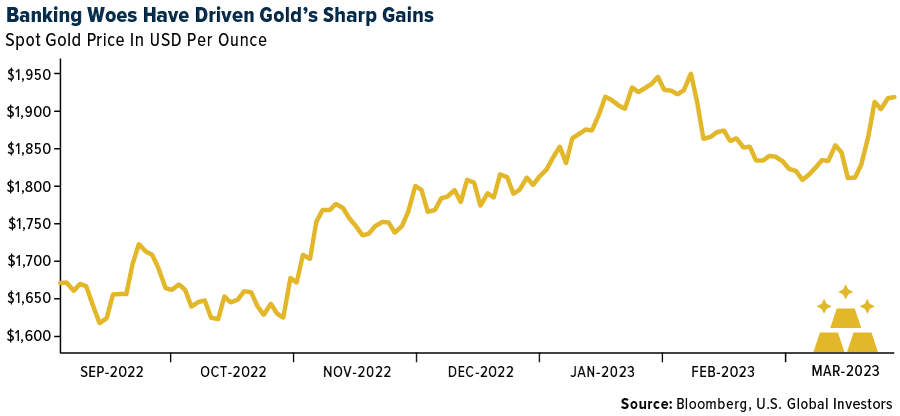Strengths
- The best performing precious metal for the week was silver, up 10.16%, in response to the strong move in gold. Gold rose to a near six-week high, reports Bloomberg, as ongoing market turmoil linked to Credit Suisse Group AG spurred demand for havens. The lender’s bonds slumped on Thursday after initial optimism over the intervention of the Swiss central bank faded, while broader risk assets continued to suffer amid the bearish mood. Gold has surged more than 6% over the past week following the collapse of some U.S. banks, which triggered broader concerns about financial stability, the article continues.

- The volume of rough diamond imports to India in February came in slightly below the five-year average, as it fell by 14% year-over-year (but up 96% month-over-month). In contrast, the value of imports came in close to the five-year average but still down 18% year-over-year, implying that rough prices increased by 5% month-over-month.
- SilverCrest Metals’ commercial production at its Las Chispas mine beat expectations. Adjusted earnings per share (EPS) of $0.09 greatly surpassed consensus of $0.04 and operating cash flow per share was $0.14 per share versus the $0.07 per share consensus. The beat was driven by lower operating expenses as a significant portion of mill feed was previously expensed surface stockpile material.
Weaknesses
- The worst performing precious metal for the week was platinum, but still up 1.55%. At Evolution Mining, the Ernest Henry underground mine was impacted by heavy rainfall last week with water entering mine workings. All personnel were removed from the mine. Production at the mine has been suspended. The company estimates it will take roughly six weeks before mining is resumed.
- February continued the trend of physically backed gold ETF outflows. These outflows totaled $1.7 billion in the month as investors reacted to expectations of sustained high interest rates following higher-than-anticipated inflation figures, notably in the U.S. This marked the tenth consecutive month where ETF gold tonnage demand was negative, which is the longest consecutive run of losses since January 2014.
- Northern Star Gold’s production at its Pogo gold mine has stopped due to the failure of a ball mill motor. Repairs are expected to take up to six weeks. Group guidance for fiscal year 2023 is unchanged because the lost production of 20-40,000 ounces gold is expected to fall within the guidance range.
Opportunities
- Whilst much focus has been directed at unit cost inflation, which has run at a CAGR of between 11-15% (depending on the producer) over the past three years, capital expenditure has risen even faster. South African PGM industry capex is likely to top R50 billion in 2023, representing a four-fold increase over the last seven years/ 22% CAGR off the 2016 lows.
- AngloGold Ashanti and Gold Fields have announced a proposed JV to combine operations at Tarkwa and Iduapriem, both in Ghana, to create the largest gold mine in Africa. Under the proposed structure, the JV would be constituted within Gold Fields Ghana, and operated by Gold Fields (AngloGold would contribute 100% of Iduapriem). Excluding the interest to be held by the Government of Ghana, Gold Fields would have a 67% interest in the JV & AngloGold 33%.
- According to Canaccord Genuity, the bond market and gold aren’t buying into the Fed’s increasing hawkishness; since the September 26 peak in the U.S. Dollar Index, the implied Fed terminal rate has risen to 60 basis points, yet long-term yields have fallen since then, and the gold price is up over $250 per ounce. Year-to-date, gold is up 2.4% while the S&P/TSX Gold Index is down 5.0% in U.S. dollar terms.
Threats
- Botswana will continue to demand a larger share of diamond output from its Debswana Diamond joint venture with Anglo American’s De Beers, as talks to renew a sales deal continue, Reuters reported, citing Botswana President Mokgweetsi Masisi.
- Sibanye has announced an incident at its U.S. PGM operations during scheduled non-routine maintenance, which has resulted in damage to the shaft infrastructure at Stillwater West. Sibanye confirms that the shaft infrastructure will require remediation, impacting access to deeper mine levels. As a result, Sibanye has suspended production from Stillwater West for four weeks, with the impact to 2023 production guided at 25-30,000 ounces.
- According to the mining ministry, corporate gold output in Burkina Faso decreased by 13.7% in 2022 compared to a year earlier as a result of the closure of five out of 17 mines, owing to insufficient security. It claimed that industrial output decreased from 66.8 tonnes in 2021 to 57.67 tonnes in 2018, a statistic that does not take into account the nation's countless artisanal miners. Since gold is the principal export of the landlocked Sahelian country, the drop will have a comparable impact on government revenue and regional income.

